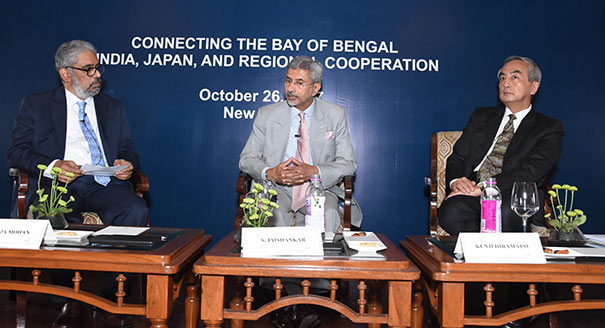Registration
You will receive an email confirming your registration.
The Bay of the Bengal, which acts as a bridge between the Pacific and Indian oceans, is re-emerging as a critical geostrategic subregion. As Indo-Japanese cooperation deepens, the Bay of Bengal will become a key area in which to facilitate strategic engagement between two major Asian powers.
Carnegie India, in partnership with the India Development Foundation, hosted a seminar to review Indo-Japanese economic and security cooperation in the region, and identify new possibilities for developing regional connectivity corridors and strengthening maritime security in the Bay of Bengal.
DISCUSSION HIGHLIGHTS
- The Road Ahead for India and Japan: Participants agreed that the Indo-Japanese partnership has immense potential to transform the Bay of Bengal region. They argued that India is opening up to ideas of regional integration, citing as evidence Indian initiatives such as the development of coastal shipping and inland waterways with Bangladesh, ports and roadways in Sri Lanka, and the Sittwe port in Myanmar. Participants welcomed Japan’s efforts toward regional development, stating that it was a win-win situation for both countries that could increase the economic viability and strategic value of collaborative projects. They argued that the Bay of Bengal region is a place where India’s Act East Policy and Japan’s Free and Open Indo-Pacific Strategy converge, adding that forums such as the Act East Forum could connect the Bay of Bengal region with the wider Indo-Pacific region.
- Maritime Security Cooperation in the Bay of Bengal: Participants argued that a comprehensive collaborative mechanism would enhance maritime security in the Bay of Bengal region. They highlighted a number of areas for potential cooperation, including capacity building efforts, Maritime Domain Awareness (MDA), and Humanitarian Assistance and Disaster Relief (HADR). All participants agreed that Indo-Japanese cooperation on the Bay of Bengal is critical for maritime security of the region. They stated that the lack of political trust between regional actors has been a major obstacle to such cooperation, and recommended that bilateral and trilateral coordinated patrols in the region be increased. This, they said, would build trust, while contributing to the HADR and MDA efforts in the region. Participants suggested that India and Japan should collaborate with other states to accurately map and develop connectivity linkages in the Bay of Bengal.
- Modernization of India’s Infrastructure: Participants said that common cultural values between India and Japan could enable the convergence of political, economic, and strategic interests. They stated that although India and Japan have collaborated on a number of projects such as the Delhi Metro and the High Speed Rail, the slow rate of approvals concerning project implementation and the closed nature of the Japanese economy slow down the efficiency of joint collaborations. Participants also discussed the prospect of Indo-Japanese cooperation penetrating African and Latin American markets. They stated that one way to achieve this would be by relocating Japanese manufacturing plants to India, helping Japanese products become cost effective and cost competitive.
- Trans-border Infrastructure and Economic Development: Participants said that all regional stakeholders of the Bay of Bengal share similar developmental problems. Some discussants argued that economics drive politics, arguing that respective governments should thus encourage economic activity. Strong regional economic cooperation could contribute to sustainable political alliances, they said. Participants also called on regional governments and private sector firms to initiate infrastructural development programs in the region. All participants agreed that Indo-Japanese collaboration would have a transformative impact on the security and economic architecture of the Bay of Bengal. They emphasized that collaborative infrastructure projects are the key to regional development.
This event report was prepared by Deepakshi Rawat and Rhea Menon, interns at Carnegie India.
Agenda
10:00 to 10:30 a.m.
Tea and Registration
10:30 a.m.
India and Japan: The Road Ahead
Subrahmanyam Jaishankar, Kenji Hiramatsu, C. Raja Mohan
11:45 a.m. to 1:00 p.m.
Regional Maritime Security Cooperation
Tetsuo Kotani, Darshana M. Baruah, Jayanath Colombage
Moderated by Shekhar Sinha
1:00 to 2:15 p.m.
Lunch
2:15 to 3:00 p.m.
Japanese Cooperation in the Modernization of India’s Infrastructure
Amitabh Kant
3:00 to 4:15 p.m.
Trans-Border Infrastructure and Economic Development in the Bay of Bengal Region
Shubhashis Gangopadhyay, Mohammad Yunus, Shine Zaw-Aung
Moderated by Tariq Karim
4:15 to 5:00 p.m.
Concluding Remarks and Vote of Thanks
C. Raja Mohan and Shubhashis Gangopadhyay
Speakers
Darshana M. Baruah is a research analyst at Carnegie India
Jayanath Colombage is the director of the Center for Indo-Lanka Initiatives at the Pathfinder Foundation. He was previously the commander of the Sri Lankan Navy
Shubhashis Gangopadhyay is the research director of India Development Foundation
Kenji Hiramatsu is the ambassador of Japan to India
Subrahmanyam Jaishankar is the foreign secretary of India.
Amitabh Kant is the chief executive officer of NITI Aayog, India
Tariq Karim is a distinguished fellow at Vivekananda International Foundation and was previously high commissioner of Bangladesh to India
Tetsuo Kotani is a senior research fellow at Japan Institute for International Affairs
C. Raja Mohan is the director of Carnegie India
Shekhar Sinha was flag officer commanding in chief of Western Command, Indian Navy
Mohammad Yunus is a senior research fellow at Bangladesh Institute of Development Studies
Shine Zaw-Aung is partner at First Rangoon Cooperation and a researcher at the Myanmar Institute for Strategy and International Studies
